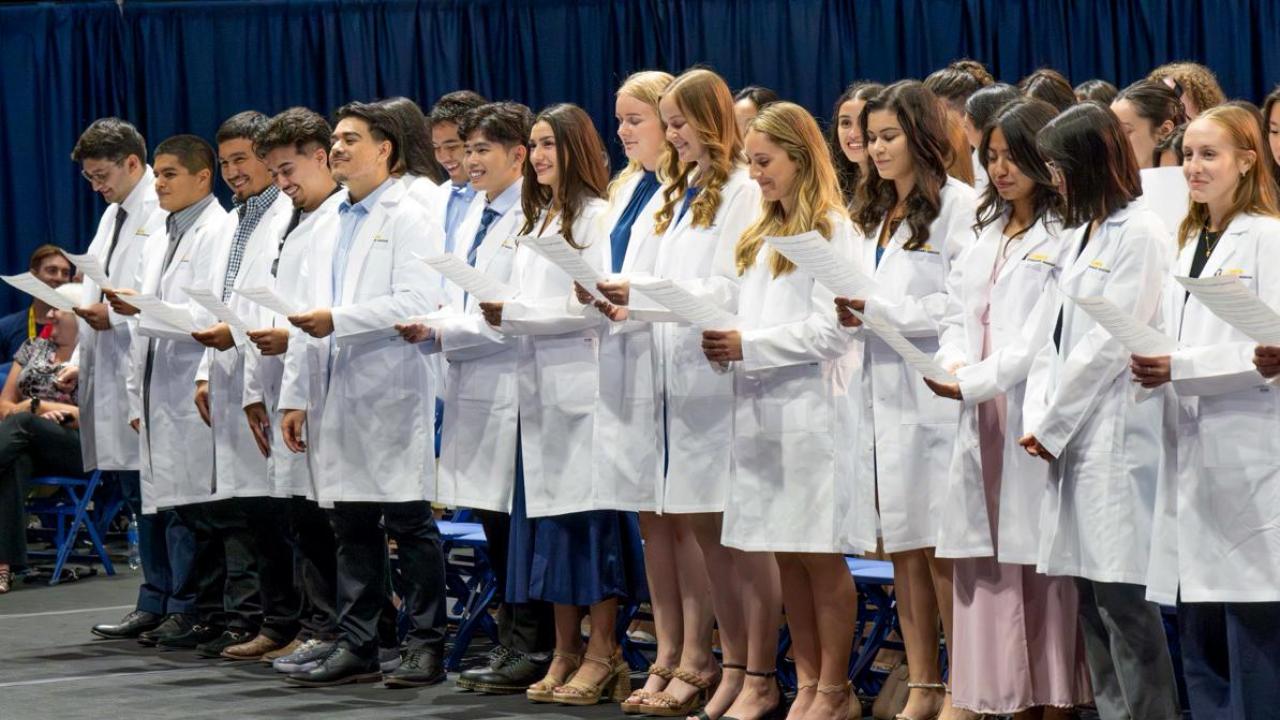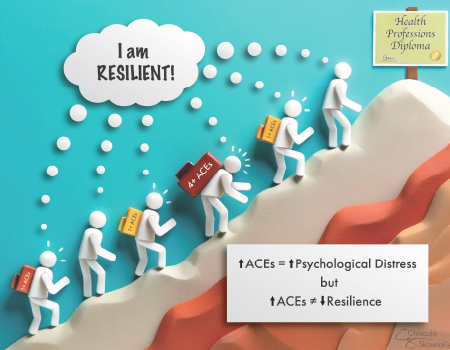
Impact of Childhood Adversity on Health Professions Students
Graduate health professions students from socially disadvantaged groups are more likely to have had encountered adversity in their childhood. And according to a new study, that reality also could lead to personal struggles during their education and careers.
The longitudinal research examined the wellbeing of UC Davis students in three of its professional schools: medical, veterinary and nursing.
The study published in the journal Academic Medicine set out to determine the relationship between adverse childhood experiences — known as ACEs — with social disadvantage, psychological distress and resilience. A total of 240 students completed the study’s survey, which contained an expanded Adverse Childhood Experiences Questionnaire (ACEs-14). The survey also included a resilience scale and a well-being index.
Among the findings:
- Childhood adverse experiences are common among UC Davis health professions students and those from disadvantaged backgrounds, such as first-generation college graduates and students whose racial and ethnic backgrounds are underrepresented in health care
- ACEs exposures put students at risk of developing mental health issues during training and beyond. Experts fear this could further increase the growing rate of burnout in the U.S. health workforce, and compromise patient safety
- ACEs exposures were not associated with lower resilience, in contrast to previous research, suggesting that students in this study are extraordinarily resilient despite childhood adversity and structural disadvantage
ACEs can provide a preview of future mental health challenges
Andrés Sciolla, professor emeritus of clinical psychiatry, is the lead author of the study that examined the relationship between adverse childhood experiences with social disadvantage, psychological distress and resilience.
“ACEs are among the most robust, if not the most robust predictor of mental health problems even decades later,” said Andrés Sciolla, the study’s lead author and professor emeritus of clinical psychiatry in the Department of Psychiatry and Behavioral Sciences.
“Those problems, ranging from burnout, substance abuse and suicide, have reached epidemic proportions among health professions students and practitioners,” Sciolla added. “ACEs exposure, therefore, represents a potential vulnerability to develop those problems.”
The study’s researchers, all from UC Davis, suggest that programs and services within the School of Medicine, School of Veterinary Medicine and the Betty Irene Moore School of Nursing at UC Davis, should be trauma-informed and consider social inequities to better support these students’ mental health and success.
"We need to keep supporting our students. Yes, some are facing more psychological stress, but they’re also showing incredible resilience. That’s a real strength,” said School of Nursing Clinical Professor Elizabeth Rice, a study co-author. “Our Learning Performance Teams are an exciting resource that offers great promise for all our students.”
Added co-author Karl Jandrey, associate dean of the UC Davis School of Veterinary Medicine: “The awareness of our findings is essential to help plan program improvements to facilitate an environment fit for learning. This is foundational to a lifetime of caregiving where the practitioner will thrive.”
How UC Davis supports nursing, medical and veterinary students
The three professional schools have programs in place to assist students through their long and rigorous academic journeys.
Since 2019, School of Nursing students have benefitted from the Learner Performance Team (LPT). It brings together experienced faculty and education experts to support students with personalized learning plans tailored to their unique needs. For students who have experienced adverse childhood events, the research-based approach employed by LPT capitalizes on the high-level of resilience these students possess and offers individualized guidance and support in their academic learning. By offering both referrals and self-referrals, the team creates an inclusive space where every student can get the support they need to succeed.
The School of Medicine has several initiatives, such as an academic coaching program, career advising, specialty advisors, the Office of Student Learning and Educational Resources, Office of Student Wellness and the Office of Student and Resident Diversity.
The veterinary school teaches a professional skills curriculum, also known as the “doctoring” program, which offers instruction on mental health and wellbeing during their first three years. Students also learn about suicide prevention. In addition, students can access a counseling team, a wellness room, wellness initiatives and join the student-run health and wellness club.

Health professions students from socio disadvantaged backgrounds are more likely to have faced adverse childhood experiences — yet can be extraordinarily resilient (Illustration: Chrisoula Toupadakis Skouritakis).
Despite adverse childhood experiences, students showed resilience
According to the study, past research has shown that ACEs — traumatic experiences such as child maltreatment, witnessing family violence or being in a home where someone abuses drugs or alcohol — are associated with negative health and psychological outcomes later in life. The more traumatic experiences a child endured, the greater the ACE score.
About two-thirds of the UC Davis students surveyed for the study reported at least one ACE, while a quarter of the students reported four or more compared with their non-disadvantaged peers. No student reported exposure to all 14 ACE factors.
 Childhood trauma increases the risk of health professions students developing mental health issues. The UC Davis School of Medicine, the Betty Irene Moore School of Nursing at UC Davis and the UC Davis School of Veterinary Medicine have programs in place to assist students through their long and rigorous academic journeys.
Childhood trauma increases the risk of health professions students developing mental health issues. The UC Davis School of Medicine, the Betty Irene Moore School of Nursing at UC Davis and the UC Davis School of Veterinary Medicine have programs in place to assist students through their long and rigorous academic journeys.
However, most students in the study showed normal or even high resilience, which is the ability to overcome stress.
The authors noted some limitations in their study, such as how it was considered an early snapshot at the beginning of the students’ professional education. Also, they noted, the study only looked at students at one university and its findings may not apply elsewhere.
Co-authors include the School of Nursing’s Rice and Cara Sandholdt; Karl Jandrey from the School of Veterinary Medicine; and Margaret Rea, Machelle Wilson and Michael Wilkes from the School of Medicine.
